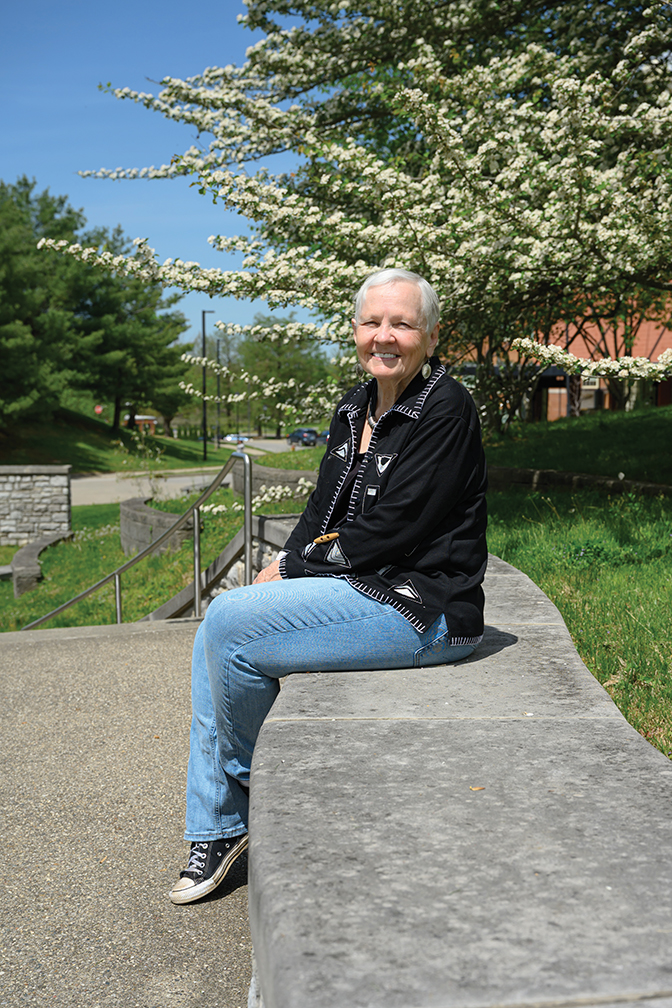When Bobby Starnes was 7 years old, while driving through Berea from her home in Dayton, Ohio, to family-owned land in Knott County, Ky., her father pulled over in front of Boone Tavern. He rolled down his car window, pointed a finger at one of the buildings on the Berea College campus, and said, “That is Berea College. They help people there.”

Whenever her normally taciturn dad said something, Starnes listened. This was no exception. Her strong memory of that moment planted a seed of connection that didn’t fully blossom until decades later, when the now-Dr. Bobby Starnes became a professor at Berea College. As a first-generation high school graduate from Appalachia, she offers wisdom and empathy to many Berea students from similar backgrounds and experiences.
Born in Knott County on Caney Creek at the mouth of Holly Bush, Starnes was the sixth child of seven born to a coal miner and a homemaker. Her father entered the mines at age 11 to support his family after his father died of Black Lung complications. Her mother was educated through sixth grade.
During Starnes’ first five years, she lived on the mountain that her family had owned since just after the Revolutionary War. That’s when outside factors, primarily the mechanization of mining, forced the family to move to Dayton. Her father ran a freight elevator there; her mother worked at a factory, then as a nurse’s aide. Making a living was a struggle for the family of nine.
The city was a hard place for Starnes to grow up. The family lived in a cultural enclave of fellow displaced Appalachians, but their accents, culture and values were not in line with other city residents beyond their small group. She did not feel welcome or able to be herself at school. The only time she truly felt at home was when her clan would pile into their old Buick and head to the Kentucky homestead for the weekend.
“As we drove and the mountains grew closer together, I felt swaddled and safe,” Starnes said. “I could feel my body relaxing.”
Though neither of her parents graduated from high school, the importance of education was a theme in their lives. Her family was key to welcoming Alice Lloyd to the community, and her uncle donated the land to establish her namesake college. Her parents made sacrifices; all their offspring have successful careers in business, higher education and nursing.
By the time she was 17, Starnes knew she wanted to be a teacher. Winning a scholarship contest through the hospital where her mother worked made it possible to complete her first two years of college at Bowling Green State University. There, she was encouraged to take typing classes and become a secretary or a beautician. Many other students were from similar working-class backgrounds, and she said, “Nobody thought any of us would go very far.”
After a short hiatus, Starnes completed her degree at Wright College while working three jobs to support herself. Fortunately, she secured a position at a rural public school before she graduated. That began a career teaching in and empowering underserved communities. She soon moved back to the Dayton school, where she was an alumna, and forged trusting relationships with students and families, many of whom also had Appalachian roots.
I could so clearly see myself in these kids. I knew they grew up with a history that didn’t include them, so I created ways of teaching that tied in Appalachia. I helped them understand they don’t have to pretend to be what they are not.
Dr. Bobby Starnes
“I could so clearly see myself in these kids,” she said. “I knew they grew up with a history that didn’t include them, so I created ways of teaching that tied in Appalachia. I helped them understand they don’t have to pretend to be what they are not.”
Before moving to Berea, Starnes was engaged in place-based work in Montana, developing a curriculum to teach about the culture and heritage of the Indian tribes residing in the state. A call from a colleague invited her back home to Appalachia, and she agreed to give Berea College a try for a year.
“By October, I knew I was never leaving here alive,” she said. “I fell in love with teaching students who were just like me.”
A Berea Welcome
Born from her experiences, Starnes is uniquely qualified to generously welcome and sensitively anticipate the needs of Berea’s first-generation and Appalachian students. In her classes, students from Appalachian Regional Commission-identified, economically at-risk and distressed counties foster a safe and supportive community through shared meals and activities.
Starnes is an advocate for culture, language and history, and against assimilation. She infuses regional history and cultural elements, like democratic values and egalitarianism, into the class.
“They realize there’s a lot to be proud of,” she said. “To lose language is to lose culture, and I have bitterness and anger about how it was forced on me. That’s why I fight so hard for students at Berea to not give that up.”
Starnes talks with all of her students about mindsets that are holding them back. One is impostor syndrome and persistent doubt that they should even be in college. She explained that too many students have internalized false Appalachian stereotypes about their intellect. To give students a voice to speak back, she helped create buttons that say, “I am not your Appalachian stereotype.”
Starnes’ words—and life—reflect that different message. “Our classes uplift where they are from and who they are, and tell them they are exactly where they belong,” she said. “We invite serious thinking about opening their world a bit more and expanding what they perceive as their life choices. We help all students see they can be what they can’t even dream about now.”

